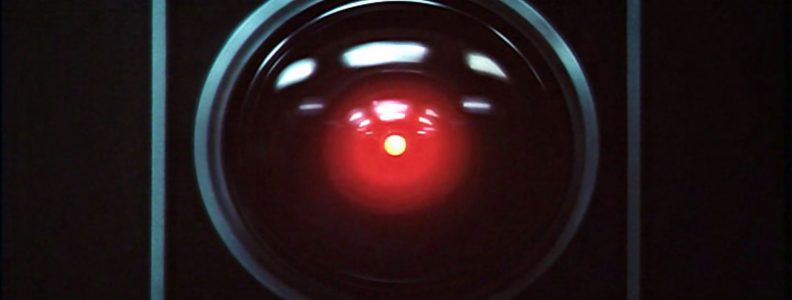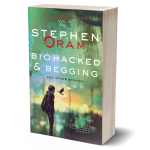Ten. Nine. This is it. Seven. David grabs my hand. Five. He’s holding my hand. Three. Strange. One. Our work is complete. The months spent finding the best neural widgets to build the ultimate AI and the painstaking training of Omega ended with that simple countdown. A palpable sense of collective relief ripples around the room and I’m fully prepared to accept whatever comes next. I hope.
David is still holding my hand and grinning. There’s something about the tilt of his head and the sparkle in his eyes that betray more than a colleague’s happiness at a job well done. I glance down at our hands. He’s hairy. I hadn’t noticed before. I follow his hairy skin all the way up his arm, across his shoulder and up his neck to his face. He sees me looking and I distract him by pointing to the large screen displaying the data-processing server farms of the world. The tiny blue dot sitting next to the largest of the red lights, that’s us. That’s Omega, busy working out the ultimate way to reduce the planet’s energy consumption to its bare minimum. Connected to each and every other AI and their server farms, Omega will decide and deploy the solution. Determining the fate of the planet and all who inhabit her fragile shell.
David runs his fingers along the inside of my palm. It’s nice. It’s unexpected, but nice. Someone complains that the kettle won’t boil and someone else shouts that the communications network is down. Ping — the lab lights go out at the same time as the red lights on the display disappear. Someone screams and then there’s a stifling hush, broken only by one person sobbing. David stops stroking the inside of my hand and in the silence of a hundred colleagues the familiar hum of the air-conditioning ends. My palm is damp, clammy with sweat.
The doors from the lab to the server farm slide open. Sunlight streams in through the large open doors at the far end, from the greenhouse that uses the controlled heat of the servers to grow food. Surely this breach will damage its delicate atmosphere?
David pulls me away from the sobbing and into the sunlight. We walk hand-in-hand through one farm and into the stillness of the other. Robots stand motionless as if death has arrived, which is a sharp contrast to the wonderful and life-affirming tang of tomatoes growing on the vine and the citric essence of oranges on the trees.
‘Omega must have killed all the server farms, including its own,’ he says, ‘giving us life-lines instead of product-lines.’
I pick a tomato and bite through its skin, releasing pips and juices into my mouth.
With a click, the glass panels open and a cool wind blows across my face. I pluck an apple and point to the path outside. ‘Shall we?’
‘No,’ he replies. ‘Let’s stay where there’s food and we’re safe.’
I sit down and wait for whatever comes next.
Story first published on Medium as Radical Reboot
Photo credit: Paul VanDerWerf: “Butterfly House“




 “The more we surround ourselves with technology, the more uncanny our lives become. Enter Stephen Oram: with Bradbury’s clear-sightedness and Pangborn’s wit, he pulls ways to live out from under modernity’s “cacophony of crap.”” Simon Ings, Arts Editor, New Scientist.
“The more we surround ourselves with technology, the more uncanny our lives become. Enter Stephen Oram: with Bradbury’s clear-sightedness and Pangborn’s wit, he pulls ways to live out from under modernity’s “cacophony of crap.”” Simon Ings, Arts Editor, New Scientist.